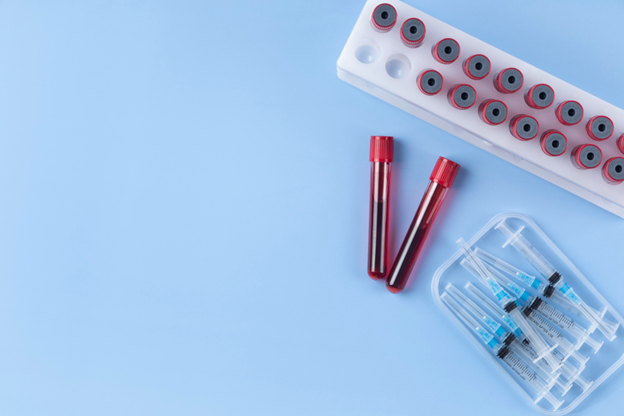What is a Complete Blood Profile (CBP) Test?
A Complete Blood Profile (CBP) test, also known as a Complete Blood Count (CBC) test, is one of the most commonly used blood tests in medical practice. It helps evaluate your overall health and detect a wide range of disorders, such as anemia, infection, and many other diseases. The CBP test measures different components of your blood, providing a comprehensive picture of your health status.
This simple, non-invasive test involves drawing a sample of blood, which is then analyzed to evaluate the number and characteristics of blood cells, including red blood cells (RBC), white blood cells (WBC), platelets, and hemoglobin levels. The CBP test is crucial for identifying early signs of health problems, and it can be used to monitor the effectiveness of treatments and assess whether a particular disease is progressing or improving.
Components of the Complete Blood Profile Test
The CBP test consists of several components, each of which offers valuable information about the condition of various bodily systems:
- Red Blood Cells (RBC): These cells are responsible for carrying oxygen throughout the body. A low RBC count may indicate anemia, while a high count could be due to dehydration or other medical conditions.
- White Blood Cells (WBC): White blood cells help fight infections and diseases. An elevated WBC count often signals the presence of infection, inflammation, or an immune system disorder. A low WBC count may suggest a weakened immune system.
- Platelets (PLT): Platelets are essential for blood clotting. If your platelet count is too low, you may have difficulty stopping bleeding, while a high count can lead to blood clots, increasing the risk of stroke or heart attack.
- Hemoglobin (Hb): Hemoglobin is a protein in red blood cells that binds to oxygen. Low hemoglobin levels can indicate anemia, while higher-than-normal levels may suggest dehydration or lung disease.
- Hematocrit (Hct): This measures the proportion of red blood cells in the blood. It helps diagnose conditions like anemia, polycythemia, and dehydration.
- Mean Corpuscular Volume (MCV): This measures the average size of red blood cells. MCV helps doctors diagnose types of anemia, such as microcytic anemia (small red blood cells) or macrocytic anemia (large red blood cells).
- Mean Corpuscular Hemoglobin (MCH): This measures the average amount of hemoglobin in a red blood cell. It helps in identifying the type of anemia a person may have.
- Mean Corpuscular Hemoglobin Concentration (MCHC): This measures the concentration of hemoglobin in a red blood cell. It helps in the diagnosis of different types of anemia.
Why is the CBP Test Important?
The CBP test plays a significant role in monitoring your health, diagnosing illnesses, and assessing the effectiveness of ongoing treatments. Some of the key reasons why a CBP test is important include:
1. Diagnosis of Anemia
Anemia is one of the most common conditions diagnosed through a CBP test. The test can reveal whether you have low red blood cell counts or low hemoglobin levels, both of which are indicators of anemia. Early detection allows for prompt treatment to address the root cause of the condition.
2. Detection of Infections
An elevated white blood cell (WBC) count can indicate an infection or an ongoing inflammatory process in the body. The CBP test helps identify infections before symptoms become severe and can even pinpoint the type of infection, enabling doctors to recommend the appropriate treatment.
3. Monitoring of Chronic Diseases
If you have an existing chronic disease, such as cancer, diabetes, or kidney disease, regular CBP tests can help monitor changes in your blood cell counts. This can provide valuable information about how well your body is coping with the disease or the effects of treatments like chemotherapy.
4. Blood Disorders
The CBP test helps diagnose and monitor blood disorders such as leukemia, polycythemia, and thrombocytosis. It can detect abnormal levels of blood cells or abnormalities in their shape or function, which could be indicative of a blood-related disorder.
5. Monitoring of Nutritional Deficiencies
Low hemoglobin levels detected in the CBP test can point to nutritional deficiencies, such as iron, folate, or vitamin B12 deficiencies. These nutrients play an essential role in the production of healthy red blood cells. Early detection can prompt dietary changes or supplementation to address the deficiency.
When is a CBP Test Ordered?
Your doctor may recommend a CBP test as part of a routine check-up or if you are experiencing symptoms like fatigue, weakness, fever, unexplained weight loss, or frequent infections. The test may also be ordered if you are undergoing treatment for a medical condition that affects blood counts, such as cancer, or if you have been diagnosed with a chronic illness.
Additionally, the CBP test may be used to monitor your health after major surgeries, during pregnancy, or to evaluate your overall well-being before starting any new medications.
What Do the Results Mean?
The results of a CBP test provide valuable insights into your health. Here’s what the results can indicate:
- High Red Blood Cell Count (RBC): This could indicate dehydration, lung disease, or certain heart conditions.
- Low Red Blood Cell Count (RBC): This may suggest anemia, bleeding, or nutritional deficiencies.
- High White Blood Cell Count (WBC): This could be a sign of an infection, inflammation, or a blood disorder.
- Low White Blood Cell Count (WBC): A low WBC count can signal a weakened immune system or bone marrow problems.
- High Platelet Count: This could be a sign of an infection, inflammation, or even a bone marrow disorder.
- Low Platelet Count: Low platelet counts can result in easy bruising or excessive bleeding.
- Low Hemoglobin Levels: Low hemoglobin may indicate anemia or chronic disease.
Each of these results provides key information that helps doctors assess your health and recommend necessary treatments.
Preparing for a CBP Test
There is generally no special preparation required for a CBP test. However, it is recommended that you:
- Inform your doctor about any medications: Certain medications can affect your blood count, so it’s essential to inform your healthcare provider about any prescription or over-the-counter drugs you are taking.
- Avoid strenuous exercise: Engaging in heavy physical activity right before the test may affect the results of the blood count, so it’s advisable to avoid intense exercise on the day of the test.
What Happens After the Test?
After the CBP test, the sample of your blood will be analyzed in a laboratory. The results typically come back within a few hours to a day, depending on the lab. Once the results are available, your doctor will discuss them with you, explaining any abnormalities and their potential implications for your health.
Conclusion
The Complete Blood Profile (CBP) test is a critical tool in diagnosing a variety of health conditions, including infections, anemia, blood disorders, and chronic diseases. By measuring the levels and health of different components in your blood, this test provides essential insights into your overall health.
Regular CBP tests can help detect issues early, improve your treatment outcomes, and allow your healthcare provider to make informed decisions about your care. If you’re experiencing symptoms like unexplained fatigue, frequent infections, or changes in your overall health, a CBP test can provide valuable information.
Always work closely with your healthcare provider to interpret your CBP results and take the necessary steps toward maintaining or improving your health.
Schedule your test today at Doctor’s Diagnostic!

